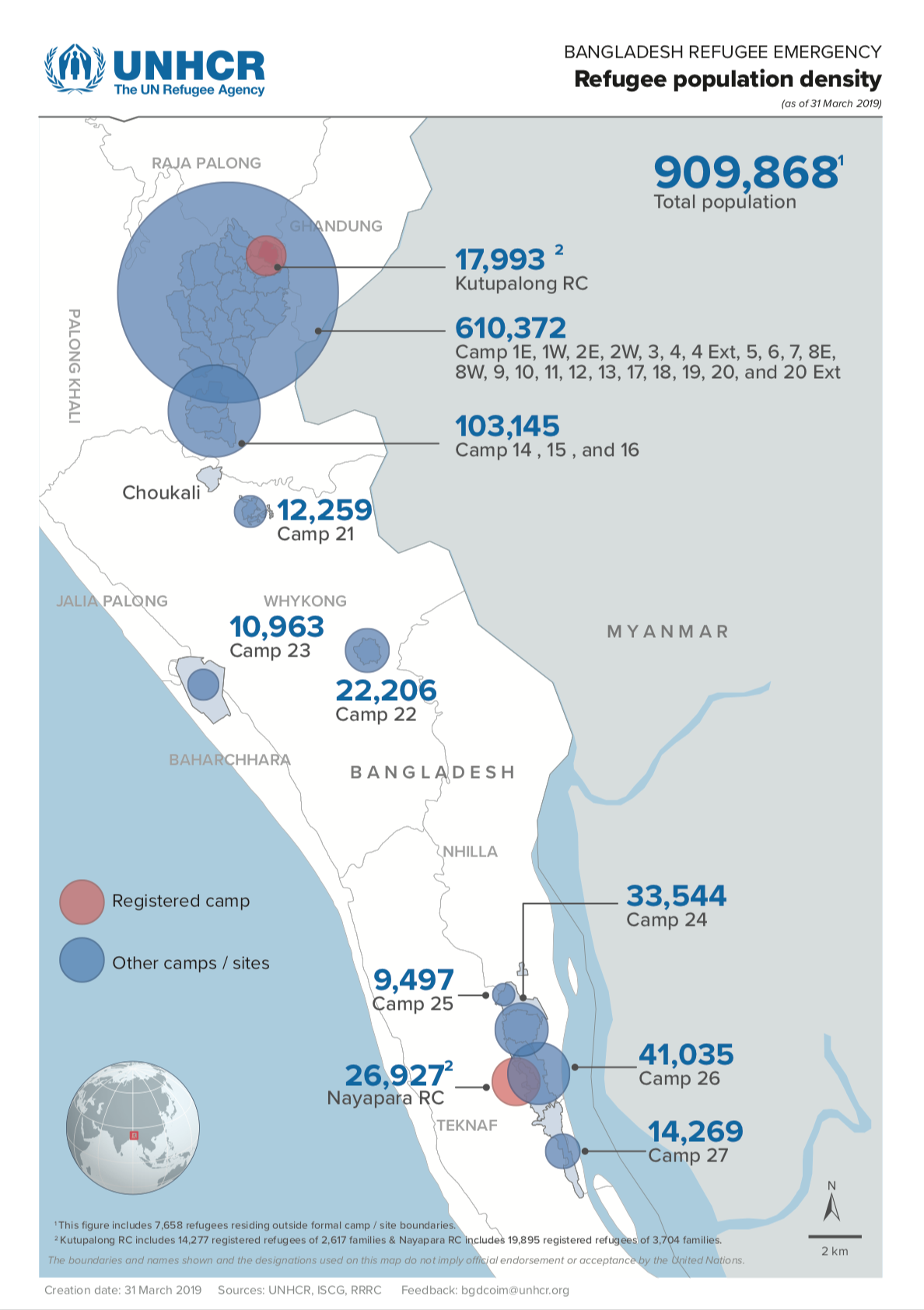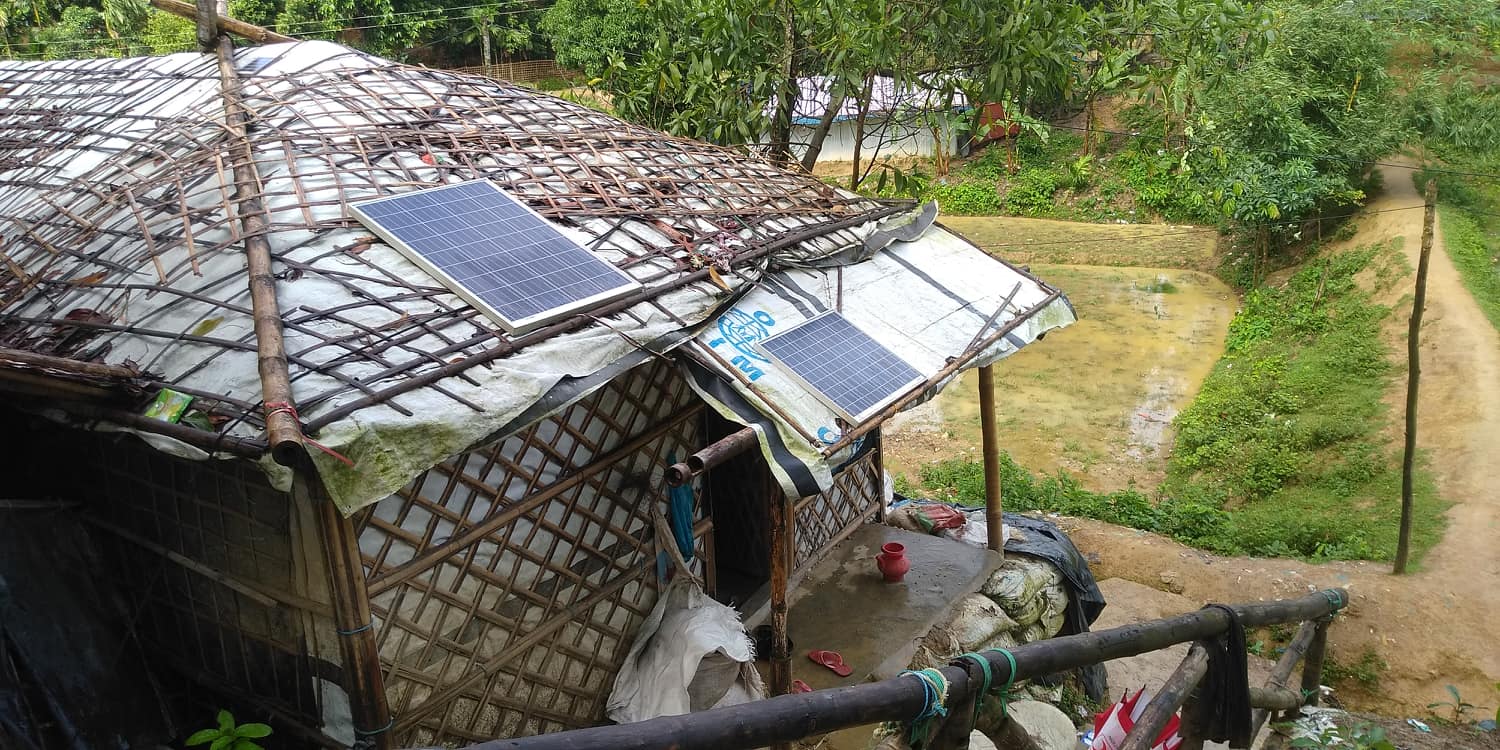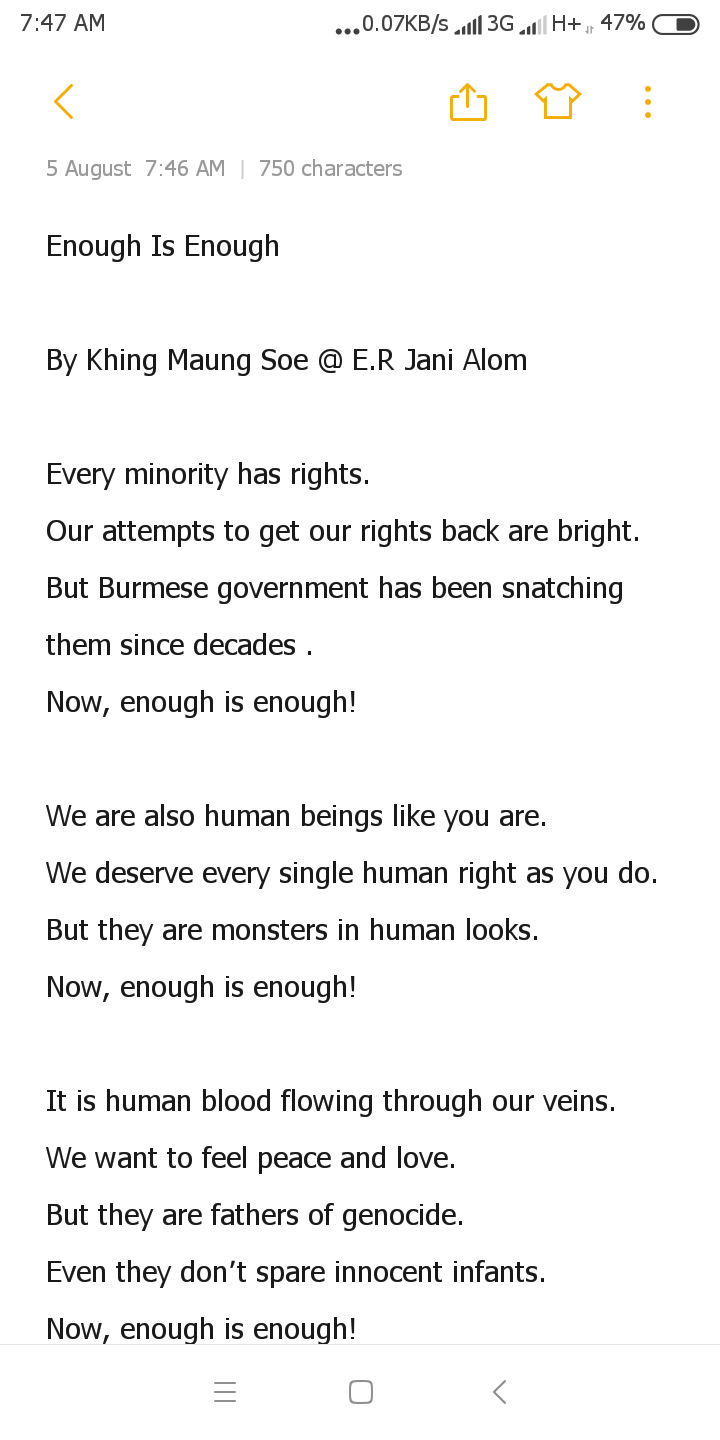“I would like to be part of an effort to promote unity and peace across the world. I feel that people often see the worst in each other and changing this outlook might help resolve conflicts.”
–Khing Maung Soe, refugee humanitarian
“Thus, the ultimate choice for a man, inasmuch as he is driven to transcend himself, is to create or to destroy, to love or to hate.”
― Erich Fromm, The Sane Society
Many voices wanting to be heard
In the last two months it has been my great pleasure and honor to meet (via WhatsApp, Skype, FaceTime Messenger, etc.) many Rohingya refugees that now call Cox’s Bazar in Bangladesh their (hopefully temporary) home. There are many poets in the camps, both men and women, and even writing groups that meet regularly.
It is safe to say there are many hundreds of Rohingya poets who have collectively written thousands of poems. True, many poems are written just for the cathartic effect, private missives not meant to read read widely or even at all. But the majority of these poems, at least this has been my experience, were written to be shared as widely as possible as calls to the world outside of Cox’s Bazar, and especially to those in the global North living in nations that might have some influence on the situation that gave rise to this refugee crisis. Indeed, these many voices want -need, even- to be heard.
As now a ‘stateless’ people, the Rohingya face a literal existential crisis with no clear resolution. The future appears both dark and unclear for both the entire culture and for families and individuals, especially the young adults as they attempt to create a life of meaning in the artificial world that is a refugee camp. Each in their own way are asking ‘who am I and where do I belong?’ as they question their individual and collective identity.
How do the refugees cope?
In his classic book The Sane Society the social critic Erich Fromm argues that all humans crave meaning in their lives, and part of the search for meaning is driven by a need to have agency, a control over one’s fate, a sense of free will. For some the need for control can lead to the act of destroying through harming material objects, themselves, or those in the world around them. But for others that need can be sated by the act of creating something, with the former acts being fueled by hate and the latter fueled by love.
In the case of the poets I have featured in my last several blog posts, they show a determination to love themselves and others through creating poems that describe and comment on what is happening to them and other Rohingya, pouring raw emotion into

nearly every line.
Khing Maung Soe, refugee humanitarian
Khing Maung Soe is yet another example of a young person, faced with a life situation that would try the meddle of anyone, who has responded with love given voice through poetry. This love he demonstrates is directed, to be sure, at his own Rohingya sisters and brothers, but in the same breath he shows a love for humanity; he is reaching out to all, the opposite of a tribalistic call to just his culture-mates.
Khing Maung Soe reached our to me and asked me to help share his poems, his voice. Khing became refugee in very young age, and has been volunteer humanitarian and poet since 2017.
I asked him how he wrote his poems, on paper, a notebook, or on a computer. None of the above was the answer.
“I write my poems on my Android phone and I don’t have computer. My colleagues also write their poems on phones like me. My poems are all in English because when I was in school, I studied five subjects in English and one in Burmes, and I always spent my time studying in English. So, me and my colleagues can write poems in English.”
Why do you write your poems, I asked.
“Because I had felt many many difficulties in my life like boredom and tension. In my refugee life when I see my community and what are they facing, how are they feeling in camp, then I become more upset after seeing them. So, I would like to spread our feelings over all, have the world know about us.
I would like to be part of an effort to promote unity and peace across the world. I feel that people often see the worst in each other and changing this outlook might help resolve conflicts.”
Like most young men and women, Khing has dreams,
“I would like to attend the College or University for four years to receive a bachelor’s degree in but the opportunity is blocked. I want to brighten our future young generation, to find the right direction and make better life.
I want to travel the world and also spend time safe with my family. It is hard to think of what I will be like or look [in the future]. If my dreams do not come true, I would not be upset, as long as I am safe and happy. I want to inspire others, not just through art, but with the way I treat them.
I also hope to do what is expected of anyone in my role and hopefully go above and beyond. I am a unique individual, and I hope that with my unique mix of personality, skills, experiences (whether good or bad), passions that I will add value where I can. My ambition is just to be part of a nation where I can get better opportunity, peace and freedom to be a survivor peacefully in this world. This is not only my aim but also our community.”
In the poems below you will find honesty, hope, vision, and a call to others around the world to hear the voices of the Rohingya, all part of the human family.

Khing’s poems
He told me, “I wrote this one on World Refugee Day….”
Silent Tear Of Refugee Youths
By Khing Maung Soe
Yes,
We are Refugee
We are human being like others
But we are innocent persons
Being refugee is like prisoner
As we live in the world
But the world is not for us
The more we try to feel peace
The more we become in pain
Yes,
We are Refugee
We are from another country
But
We are un-guilty persons
Involve our name in human list.
Our skins yearn just to feel once like you
Our blood clots just to feel justice and peace
Our hearts excite just to feel freedom.
This was his first poem,
Enough Is Enough
By Khing Maung Soe
Every minority has rights.
Our attempts to get our rights back are bright.
But Burmese government has been snatching
them since decades.
Now, enough is enough!
We are also human beings like you are.
We deserve every single human right as you do.
But they are monsters in human looks.
Now, enough is enough!
It is human blood flowing through our veins.
We want to feel peace and love.
But they are fathers of genocide.
Even they don’t spare innocent infants.
Now, enough is enough!
O’ the soil of my motherland!
Here in refugee camps,
The broken wind always reminds us the whiff of your scent.
Every moment narrates your story.
Your absence is like a curse.
Now, enough is enough!
O’ the soil!
Once the fate cheated us.
Now, the dead past seems alive.
The vanished years are filled,
With so-called intent, audacity and bravery
We want to be in your lap again soon.
The Ocean view
By Khing Maung Soe
Welcome to the wonder of the ocean
Welcome to the majesty of the sea
It’s a place where we can be
Living wild and swimming free
In the wonder world under the sea
You are awesome and hilarious
With all the living creatures and their sparkly glow.
The creature are succumbing because of the pollution,
But delightfully there are people who have come up with a solution.
The feature of the ocean is huge
Your deep eyes and circle are the most unique
You must know more than any of us
Between in and between out
Between north and between south
Between west and between east
Between time and between space
A song come from the shell of the sea
Neither infernally nor placidity
With my innocent heart, I close
The blue, ageless eye of my mind.
And now the green household is dark.
The half-moon completely is shining
Starless and chilly is the night: The sea is foaming,
And over the sea,flat on her belly,
The white children of the waves
So mystical, so magically powerful,
Spring up and dance for joy by wildly drunk.
And swiftly goes through the hurrying night
The fire which was dead at night
Shine over the tides afar,
The shimmers and glimmers so gloriously
She came a long way,
She goes a long way.
At night, the mother should have died,
The young son shall be born.
While the river flows to meet the sea
And make expanse of the ocean bright
The each voice thunder out of the deep blue sky
And the earth resounds with the joy of waves
Poet’s note: She is referred instead of ocean.
Luck…!
By Khing Maung Soe
Luck is in you whenever you look
No one can snatch it from you
Alike at a dewdrop or a floating leaf
And know that they are because they have to be.
The world will remain as it has always been.
And the leaf will be carried by the water of the river.
Hope is with you when you believe
There are also the one who have no hope
Even if you close your eyes and dream up things
We and trees throw shadows on the earth.
The earth is not a dream but living folk,
That discern, touch, and hearing don’t lie.
You can’t enter but you’re sure it’s there.
Some people say that we should not trust our eyes,
That there is nothing just seeming.
You are forgetting, the earth on which you walk
I would open a book and could decipher nothing
Searching more but getting less
Everything occurs too normally
Mine eyes are open but they cannot see for gloom of night:
I can no more than lift my heart to thee for inward light.
And now I am ready to keep running When the sun rises beyond the borderland of death.
See a new horizon every time with your eyes,
Neither what I wished nor what you wished happened
See the long shadow that is cast by the tree.
Embrace every moment with open arms,
I imagine the earth when I am no more
What has no shadow,has no strength to live.
Nothing happens, no loss, it’s still a strange pageant,
What never added up will add Up,
What was incomprehensible will be comprehended.
Afterthoughts
As I reflect on Khing’s poems I am reminded of what the social sociologist Theodor Adorno said,
“It would be advisable to think of progress in the crudest, most basic terms: that no one should go hungry anymore, that there should be no more torture, no more Auschwitz [or Gaza or Cox’s Bazar]. Only then will the idea of progress be free from lies.”
Khing choses to create rather than destroy, love rather than hate. He and Adorno share the same vision of what authentic human progress looks like. He, like the other Rohingya refugee poets I have met, is on a quest to turn suffering into a challenge to make his life -and the lives of others- better day by day. Let us learn from their example.
My nation has had yet more mass shootings in the last few days, and tears are being shed in Gilroy, California, El Paso, Texas, and Dayton, Ohio. The hate that drove the three (all-too-typical) young, white, male perpetrators to kill is toxic and is anti-human. The social chaos brewing in the US is antithetical to progress. These killers are doing the opposite of what Khing and the other Rohingya poets are accomplishing. I’ll repeat: let us learn from their example.
There are those who choose hate in all contexts and cultures, so I must add that yes, there is violence within the refugee camps, and the small number of poets with which I have been in contact of course do not represent the full picture. I’ll not commit the error of blindly romanticizing the Rohingya refugees. That said, their voices are calm, full of truth and emotion, and amply worthy of amplification.
As always, contact me if you have comments, feedback, or anything to add.


 Follow
Follow